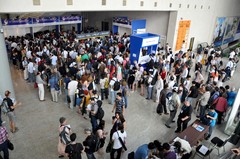Children often develop a strong interest in science at a young age. This is more common when they grow up in an environment full of opportunities to interact with scientific thinking. A connection has been found between positive experiences through playful and creative science-based activities and the development of interest in science. In order to raise and expand this interest efficiently, it is important to assess at what particular age children develop their interest in science and what kind of activities stimulate it.
What can we learn from the community of professional astronomers? In August 2012, more than 3000 astronomers gathered at the International Astronomical Union’s 28th General Assembly in Beijing, China, to discuss, share, present and debate the most exciting discoveries about the Universe. UNAWE, in partnership with the IAU Office of Astronomy for Development, handed out questionnaires to a handful of the astronomers present in order to investigate when they first became interested in their field of work. The ages of the 61 participants ranged from 23 to 70 years.
The questionnaires revealed that most astronomers developed their interest in science or astronomy before the age of 12 (60%), and almost a quarter between 13 and 18 years of age. Nevertheless, the real decision to become an astronomer happened later; nearly half of our participants decided to become an astronomer when they were already over 18 years old.
But what ignited the astronomers’ interest in the subject? A quarter of our participants did not have a specific starting point, but those who did pointed to fascination with the night sky or looking through a telescope (57%). Reading books about the Universe or sci-fi novels appears to be of great importance in creating excitement as well (28%). Additionally, teachers and the subjects taught at primary school, along with internships or availability of university courses, seem to play a role in fostering an interest in astronomy.
We can conclude that there is an optimal age at which an interest in science should be developed and fostered. Childrens' interest in astronomy is shaped from a very young age — 4 to 6 years — and the optimal age to nurture their scientific interest is before the child reaches 12. This happens to be the target age group for UNAWE’s activities.
Nevertheless, children of all ages are likely to develop an interest in Astronomy if they are exposed to it. A high number of astronomers that participated in our survey made their decision to become professional astronomers during high school (i.e. when they were older than 12). According to the survey, a very efficient way to engage children in astronomy is through the excitement of sky-observing experiences, with the naked eye or with the use of telescopes.
Note: A full analysis of the IAU GA EPO questionnaire will be published soon. Raw data is available upon request. A wider survey has now started on-line.
1. M. Segal, B. Bardige, M.J. Woika, J. Leinfelder, All About Child Care and Early Education A Comprehensive Resource for Child Care Professionals, 2006 edition, p. 149-150
2. M. Bulunus, O.S. Jarrett, Developing an interest in science: Background experiences of preservice elementary teachers, International Journal of Environmental & Science Education, Vol. 5, No. 1, January 2010, 65-84













